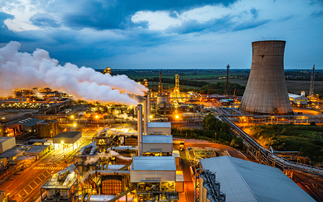Caroline Flint says Labour will fight hard in Parliament to to boost the UK's ambition in reducing greenhouse gas emissions
Smart companies get that we need to move to a low carbon economy, and in the run-up to Paris there are going to be big opportunities for business, alongside civil society and the world's political leaders, to step up and show that they understand how important this year is in the fight against climate change. Alongside the COP itself the Sustainable Innovation Forum will bring together business, governments and other key stakeholders to see how the innovation that is going to be required can be best supported.
This year, I expect to see more and more businesses reflecting the UN Secretary General's message that business can be a global force for good.
Last Parliament we pressed the government to adopt a target of decarbonising the electricity supply by 2030, and this ambitious target was supported by 83 businesses as diverse as Unilever, Microsoft and Sky. In a recent letter to the FT, businesses like Coca-Cola, John Lewis and Cisco echoed this call by asking the government to set and follow an ambitious target for the 5th Carbon Budget, which will span 2030.
We know the reason businesses are asking the government to do this - it's because if there's one thing that the transition to a low-carbon economy is going to require, it is certainty. Certainty so businesses can plan knowing that the government understands the need to substantially decarbonise and won't make repeated changes to the investor framework. And certainty the government is prepared to do what it takes to support the transition. That was the basis for the groundbreaking Climate Change Act and one of the reasons it had cross-party support in 2008. Paris gives the world the opportunity to achieve certainty across different markets and time zones.
At home though, the framework for investors is still characterised by uncertainty, and it couldn't be less clear whether the government will back a 2030 decarbonisation target for electricity if the fifth carbon budget recommends it. The Prime Minister accepted the need for the target early on in the last Parliament, but the Conservative manifesto ruled it out and the Prime Minister appeared to oppose it in a statement to the House last month. Last week one minister said that "the Government have an open mind on the subject". This is not the clarity that investors need.
In the UK we're sixth in the world for green jobs and services. My aspiration heading into the election was to get us to the top three or four in world behind the US and China and see the benefits in high skill high wage jobs that our economy so badly needs. Just think of the rewards of developing Carbon Capture and Storage - as many as 30,000 jobs and massive demand for us to export our expertise to the world.
The opportunities then, are great, but we have to get it right, and I'm deeply concerned by the current government's damaging shifts. One sector that has already been adversely affected is the sector that most obviously stands to gain from a low carbon transition, renewables. The recent Ernst and Young Renewable Energy Country Attractiveness Index described the Conservative manifesto as "painful reading for the renewables sector" and that pain is already being delivered.
The most worrying aspect is not just the changes to agreed subsidy schemes for onshore wind (although retrospective legislation is bad enough) but the effect this has on investor confidence in other renewables. When the Secretary of State made her statement to Parliament on these changes her backbenchers queued up to suggest other forms of renewables that should have their support withdrawn. This is damaging and has to stop.
Google recently announced it would be converting an old coal plant in Alabama into a clean energy powered centre for servers and the cooling systems they require - a vivid example of the potential for businesses that show creativity this year and beyond in adapting to a low carbon world. In the run-up to Paris, our role as the opposition will be to ensure the government have the right frameworks in place to support it.
This article is part of BusinessGreen's Road to Paris hub, hosted in association with PwC.






